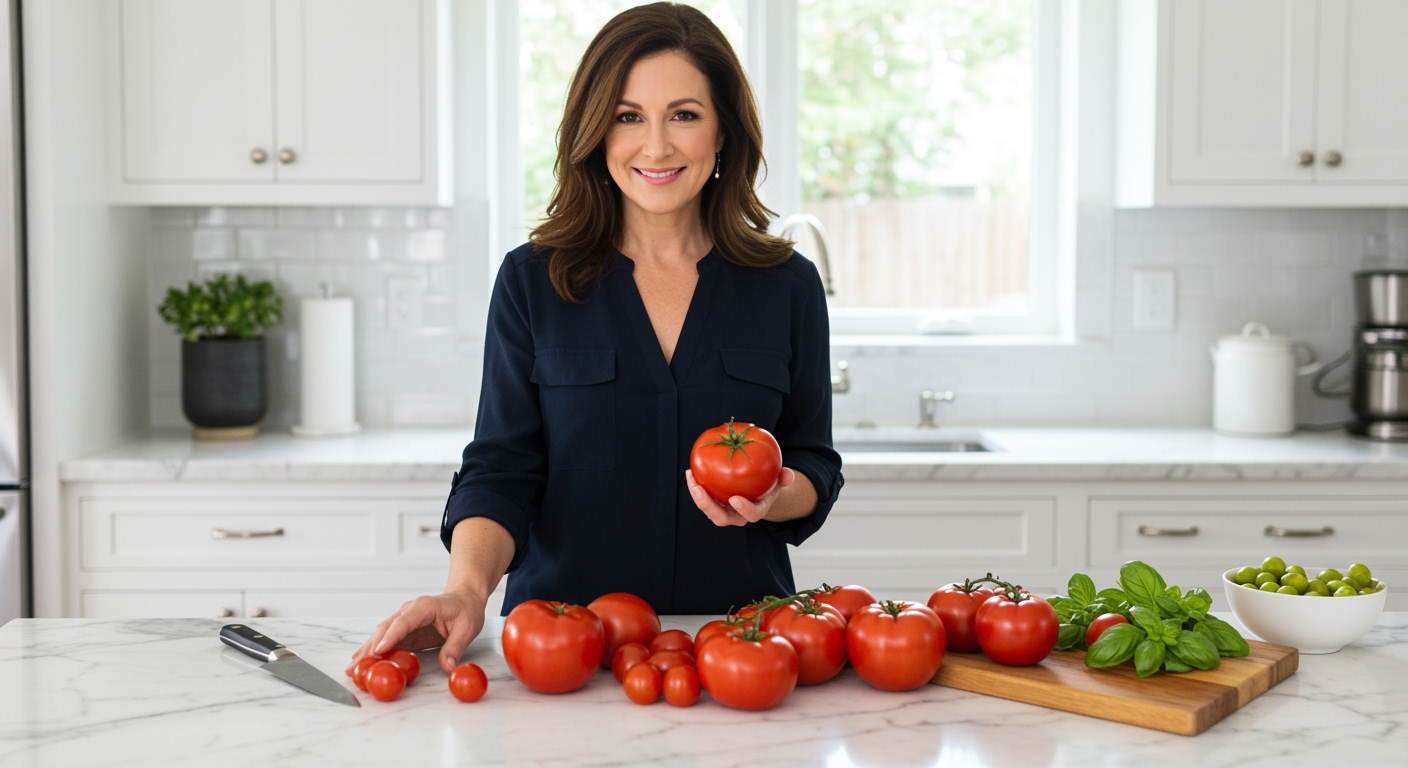✪ Key Takeaway: Tomatoes can help lower blood pressure through lycopene and potassium content, with studies showing significant reductions.
Introduction
Your doctor tells you to watch your blood pressure, but nobody mentions the red fruit sitting in your kitchen.
You might be wondering if tomatoes can actually help lower your blood pressure because you have heard conflicting information about which foods really make a difference.
Hi, I am Abdur, your nutrition coach and today I am going to explain exactly how tomatoes affect your blood pressure and whether they deserve a place in your heart-healthy eating plan.
What Makes Tomatoes Special for Blood Pressure?
Tomatoes contain two powerful compounds that directly impact your cardiovascular system.
Lycopene is the red pigment that gives tomatoes their vibrant color and acts as a potent antioxidant in your body.
This compound helps relax your blood vessels by reducing oxidative stress and inflammation in your arterial walls.
When your arteries are less inflamed, they can expand more easily, allowing blood to flow with less pressure.
Potassium is the second key player that works by balancing sodium levels in your body.
Your kidneys use potassium to help flush excess sodium through your urine, which reduces the amount of fluid your heart needs to pump.
One medium tomato provides about 292 milligrams of potassium, which is roughly 8% of your daily needs.
✪ Fact: Cooked tomatoes contain more bioavailable lycopene than raw ones due to heat breaking down cell walls.
What Does the Research Actually Show?
A recent study published in the European Journal of Preventive Cardiology followed over 7,000 participants for several years.
Researchers found that people who consumed one tomato daily had significantly lower systolic blood pressure compared to those who rarely ate tomatoes.
The study showed an average reduction of 3.3 mmHg in systolic pressure and 1.5 mmHg in diastolic pressure.
While these numbers might seem small, they represent a meaningful reduction in cardiovascular risk over time.
Another clinical trial examined the effects of lycopene supplementation on blood pressure in people with mild hypertension.
Participants who took lycopene equivalent to eating 4-5 tomatoes daily experienced a 10 mmHg drop in systolic pressure after 8 weeks.
The control group showed no significant changes during the same period.
✪ Note: Even small reductions in blood pressure can decrease stroke risk by 10-15% over time.
How Much Should You Eat for Maximum Benefits?
The optimal amount appears to be one medium tomato or equivalent tomato products daily.
This provides approximately 5-10 milligrams of lycopene, which research suggests is the minimum effective dose.
You can achieve this through various forms including fresh tomatoes, tomato sauce, tomato paste, or even tomato juice.
Tomato paste is particularly concentrated, with just two tablespoons providing the lycopene equivalent of one whole tomato.
Cooking tomatoes with a small amount of healthy fat like olive oil increases lycopene absorption significantly.
Your body absorbs fat-soluble lycopene much better when consumed with dietary fats.
Timing does not seem to matter much, so you can spread your tomato intake throughout the day or consume it all at once.
✪ Pro Tip: Add a drizzle of olive oil to your tomato dishes to boost lycopene absorption by up to 400%.
Are There Any Risks or Side Effects?
Tomatoes are generally safe for most people, but there are a few considerations to keep in mind.
Some individuals experience acid reflux or heartburn from tomatoes due to their natural acidity.
If you have gastroesophageal reflux disease, you might need to limit your tomato intake or choose less acidic varieties.
People taking blood pressure medications should monitor their levels more closely when increasing tomato consumption.
The potassium content in tomatoes could potentially enhance the effects of certain blood pressure drugs.
Those with kidney disease need to be cautious about potassium intake and should consult their healthcare provider before making dietary changes.
Oxalates in tomatoes might contribute to kidney stone formation in susceptible individuals, though this risk is relatively low.
✪ Note: Always discuss significant dietary changes with your doctor if you take blood pressure medications.
The Bottom Line
Tomatoes can indeed help lower blood pressure through their lycopene and potassium content, with research supporting meaningful reductions in both systolic and diastolic pressure.
The best medicine often grows in your garden, not in a pharmacy.
I would love to hear about your experience with tomatoes and blood pressure management, so please share your questions or thoughts in the comments below.
References
At NutritionCrown, we use quality and credible sources to ensure our content is accurate and trustworthy. Below are the sources referenced in creating this article:
- Clinic Barcelona: Eating a tomato a day reduces the risk of high blood pressure
- Medical News Today: Can eating more tomatoes daily help lower high blood pressure
- PubMed: Tomato consumption and blood pressure research
- Oxford Academic: European Journal of Preventive Cardiology study





